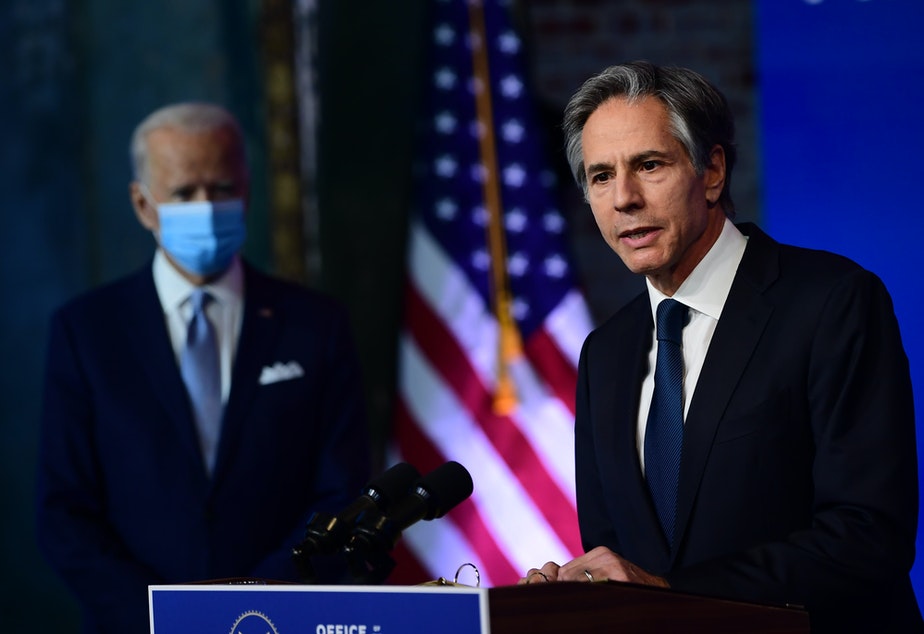President-elect Joe Biden will soon formally announce his appointments for top foreign policy and national security positions, including longtime adviser Antony Blinken as secretary of state.
As a veteran of the U.S. State Department and Democratic foreign policy establishment, Blinken’s forthcoming nomination has garnered praise for the extensive experience he’ll bring to the job as the country’s top diplomat. But advocates of a more restrained foreign policy caution that his appointment signals that the incoming Biden administration will do little to roll back America’s web of global entanglements.
Biden’s very conventional secretary of state pick offers little hope for anyone who’d want “a new and fresh foreign policy that doesn’t involve global military primacy, continued intervention overseas, and this massive military footprint” overseas, says Kelley Vlahos, a senior adviser at the Quincy Institute, a non-interventionist foreign policy think tank.
When working as Biden’s national security adviser, she notes, Blinken supported the Obama administration’s disastrous Libya campaign, despite the vice president being opposed to that particular intervention.
In 2015, Blinken—then assistant secretary of state—was also a proponent of the Obama administration’s policy of shipping arms to and sharing intelligence with Saudi Arabia in support of that country’s war in Yemen, which has proven to be a humanitarian disaster.
He served as Biden’s chief policy adviser in 2002 when the then-Delaware senator voted in favor of the use of military force in Iraq.
“In short, Blinken has agreed with some of the biggest foreign policy mistakes that Biden and Obama made, and he has tended to be more of an interventionist than both of them,” wrote Daniel Larison in a Monday article for the Quincy Institute’s publication, Responsible Statecraft.
Blinken, to his credit, has expressed some regret over his support for Saudi Arabia’s war in Yemen and criticized the wars in Iraq and Afghanistan. In other instances, however, he’s been regretful about missed opportunities for more military intervention, even criticizing the Obama administration’s Syria policy as doing “too little.”
“Without bringing appropriate power to bear, no peace could be negotiated, much less imposed” in Syria, wrote Blinken and Robert Kagan in a 2019 essay published by the Brookings Institution. “Today we see the consequences, in hundreds of thousands of civilians dead, in millions of refugees who have destabilized Europe and in the growing influence of Russia, Iran and Hezbollah.”
Late-coming regrets about past interventions and a general desire for America to do more globally suggest Blinken has not absorbed the lessons of America’s foreign policy adventures from the past couple of decades, says Vlahos.
“A lot of people who have offered some regrets for specific foreign policy mistakes—whether it be Libya or Vietnam or Iraq—is because they cannot deny the consequences. The consequences are so awful and public opinion has already decided.”
A few progressive non-interventionists have offered a rosier interpretation of the forthcoming Blinken nomination. Matt Duss, Sen. Bernie Sanders’ (I–Vt.) foreign policy adviser, described Biden’s selection as “a good choice,” saying Blinken has “the knowledge and experience for the important work of rebuilding US diplomacy.”
Likewise, most of the mainstream coverage of Blinken’s nomination has emphasized his diplomatic experience, contrasting it with Trump’s own “ricocheting strategies and nationalist swaggering” in the words of The New York Times.
Those that want a less militarized foreign policy should see some silver linings in Blinken’s forthcoming nomination, says Eric Gomez, director of defense policy studies at the Cato Institute.
“A lot of what Trump did while in office is hurt all the parts of the tool kit that weren’t the military or weren’t sanctions. He was heavily dependent on U.S. threats of force,” Gomez notes. “Having a more effective and resourced and utilized diplomatic corps, and using those peaceful non-military parts of U.S. foreign policy, it is not sufficient but it is necessary. We have to have those.”
At the same time, Gomez cautions, a more efficiently run State Department also means that Biden will be more effective in enacting a foreign policy vision that has little to do with restraint or rolling back America’s role as the global policeman.
The most cause for optimism from a Biden foreign policy, argues Gomez, comes not from the personnel he’ll pick but from the fact that more pressing concerns closer to home will prevent the incoming president from doing anything too dramatic.
“Any coming Biden administration foreign policy will be restrained by circumstance, but not design,” wrote Gomez and Brandon Valeriano, a senior fellow at Cato, in The American Conservative earlier this month. “The domestic, political, and economic environment in the United States will significantly constrain the Biden administration’s ability to adopt ambitious foreign policy goals.”
Alongside Blinken, Biden has tapped Jake Sullivan to be his national security adviser and John Kerry to be his climate czar.
Story cited here.
























